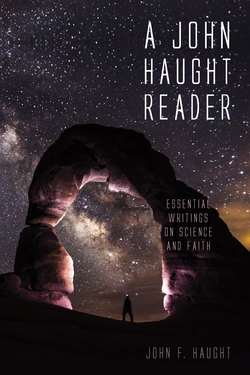Оглавление
John F. Haught. A John Haught Reader
A John Haught Reader
Table of Contents
Introduction
My Life in Science and Theology
Books by John F. Haught
1: Depth14
2: Future25
3: Freedom32
4: Beauty41
5: Truth48
6: Mystery54
7: Religion65
8: Is Religion Opposed to Science?70
9: Does Evolution Rule Out God’s Existence?80
10: Darwin’s Dangerous Idea90
11: Darwin112
12: Theology Since Darwin119
13: Darwin’s Gift to Theology134
14: A God for Evolution151
15: Revelation Theology183
16: Religion and Revelation196
17: Revelation and the Cosmos207
18: Revelation and the Self218
19: Reason and Revelation224
20: Science and Revelation232
21: Does the Universe Have a Purpose?245
22: Do We Belong Here?248
23: What’s Going on in the Universe?255
24: Purpose263
25: Astrobiology and Cosmic Purpose280
26: Suffering296
27: Suffering: From Expiation to Expectation311
28: Drama331
29: Death337
30: Death, Resurrection, and the Unfinished Universe344
31: Science and Christian Hope354
32: The Congregation of Hope374
33: How New Is the New Atheism?382
34: How Atheistic Is the New Atheism?397
35: Christian Theology and the New Atheism408
Bibliography
Отрывок из книги
Essential Writings on Science and Faith
John F. Haught
.....
Much of my writing is an attempt to articulate an alternative to literalist readings of both religious texts and the new cosmic story. In the writings collected here, I take for granted that theology and science are distinct but compatible ways of understanding and knowing. They cannot contradict each other because they both seek understanding and truth from within formally distinct horizons of inquiry. These horizons do not overlap, so they cannot meaningfully compete or conflict with each other. This is because the kind of evidence, the quality of understanding, and the type of confirmation operative in one horizon of inquiry is not identical with what passes as evidence, understanding, and confirmation in the other.
I am using the term “horizon” metaphorically. Visually speaking—and here I am following the Jesuit philosopher Bernard Lonergan—a “horizon” is the field of all the things we can see from a specific point of view.12 By analogy, a “horizon of inquiry” refers to what can be understood and known by way of a determinate method of understanding and knowing. Accordingly, since the horizon of inquiry characteristic of the natural sciences is distinct from that of theology, there can be no genuine conflict between them. This is such an obvious point, it seems to me, and yet countless contemporary scientists and philosophers claim, unreasonably and without the scientific justification they demand elsewhere, that science alone is epistemologically reliable, and hence that science and theology are irreconcilable ways of reading the world.
.....
